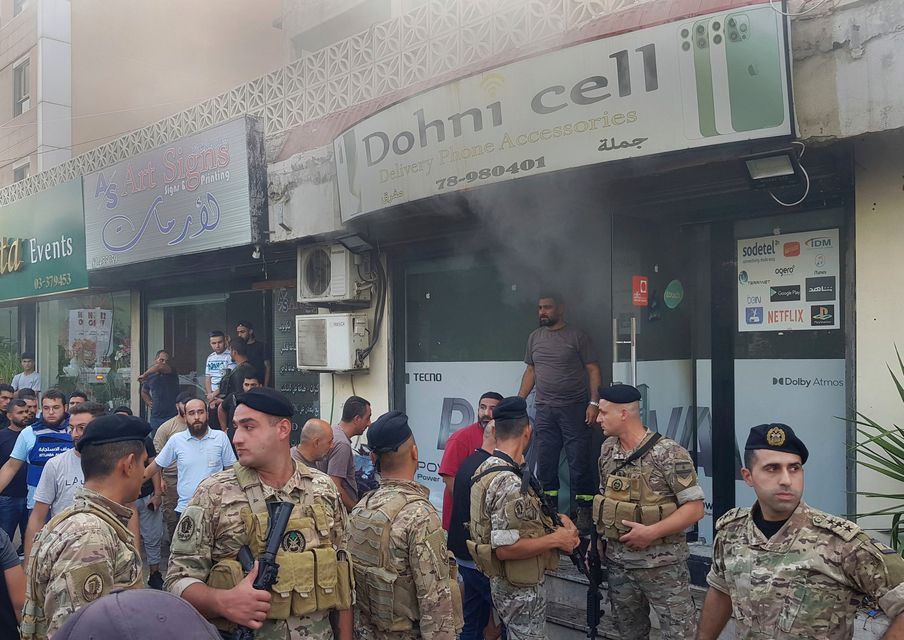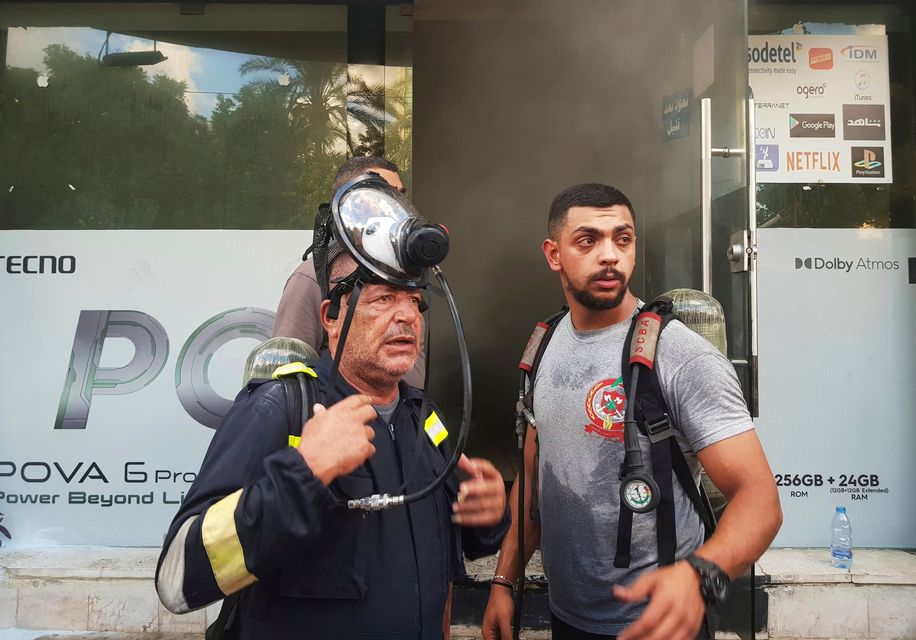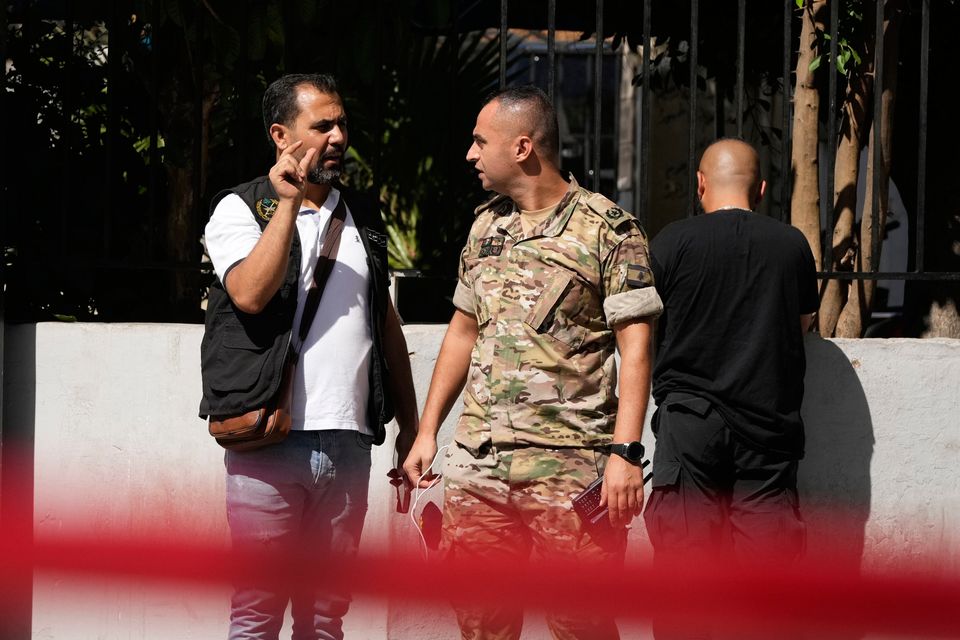“Shut it off, bury it, put it in an iron chest and lock it up,” the Hezbollah leader Hassan Nasrallah declared in February, talking about the mobile phones belonging to members and their families.
“The collaborator [with the Israelis] is the cell phone in your hands and those of your wife and your children. This cell phone is the collaborator and the killer,” he added. “Do it for the sake of security and to protect the blood and dignity of people.”
After months of near-daily fire across the Israel-Lebanon border, Hezbollah were concerned about Israeli location and tracking and spyware via mobile phones — which could allow for targeted strikes or disruptions to operations.
Pagers became the norm, with the low-tech boxes — which detect messages sent out via its radio frequency from a transmitter — used to display phone numbers for Hamas members to call back on an internal line.
The use of the mostly obscure technology, that had its heyday in the 1980s and 1990s, was supposed to bring security. But the very public way Hezbollah ditched mobile phones would reach a bloody conclusion.
Lebanese soldiers gather outside a damaged mobile shop after what is believed to be the result of a walkie-talkie exploding inside it, in the southern port city of Sidon, Lebanon, Wednesday, Sept. 18, 2024 (AP Photo/Mohammed Zaatari)
At 3.45pm on Tuesday, these same pagers began to explode — sounding like gunshots or fireworks. For the next hour, they would continue to detonate across Lebanon and parts of Syria.
CCTV footage showed explosions in supermarkets and on the street.
The pagers are said to have started to receive a message, appearing to come from Hezbollah’s leadership. They were programmed to beep for several seconds before exploding, US officials told The New York Times.
It did not stop there. More explosions were reported in the country’s south, in Beirut and in the eastern Bekaa Valley on Wednesday afternoon, this time said to be from walkie-talkies detonating.
Hospitals were once again flooded with patients.
Sources told Axios that the second attack was probably driven by the risk that Hezbollah’s investigations following the first attack would discover the security breach in the walkie-talkies.
The threat of an all-out war between the Iran-backed Hezbollah and Israel had spiked in the weeks before this attack, after nearly a year of clashes sparked by the Israeli war against another Tehran ally, Hamas, in Gaza.
On Tuesday, Israel’s internal security agency, Shin Bet, said it had foiled a plot by Hezbollah to assassinate a former senior Israeli security official using a remotely-detonated explosive device. Hours later, pagers started exploding across Beirut.
Hezbollah swiftly blamed Israel, with security sources telling multiple outlets that Israel’s spy agency, Mossad — which has a long history of pulling off sophisticated attacks on foreign soil — planted explosives inside pagers imported by Hezbollah.
Israel has so far refused to comment — not unusual for actions outside of its borders — with the search now on for answers as to how the operation was carried out. It is a trail that runs to Beirut, via Hungary, Bulgaria with a dash of Japan and Taiwan.
Anonymous officials from the US, Lebanon and Hezbollah have painted a picture of an operation months in the planning and execution, that tore a hole in Hezbollah’s security apparatus in what one member told Reuters was the biggest such breach in their history.
The number of pagers ordered by Hezbollah was between 3,000 and 5,000, and are believed to have been delivered to Lebanon some months back. They were distributed to Hezbollah members, with most being centred around Beirut. Some made it to Hezbollah allies in Syria and Iran.
Those that blew were the ones switched on and set to receive messages.
The walkie-talkies were purchased by Hezbollah five months ago, around the same time that the pagers were bought, a security source told Reuters.
Damaged pagers showed the branding of Gold Apollo, a company in Taiwan.
In a strange twist, the founder of the company, Hsu Ching-Kuang, addressed reporters outside their offices in Taipei to declare that they had nothing to do with the manufacture of the pagers — and instead, a company in Europe had used their name under license.
“The product was not ours. It was only that it had our brand on it,” Mr Hsu said. “We may not be a large company but we are a responsible one,” he added. “This is very embarrassing.”
Firefighters stand outside a damaged mobile shop after what is believed to be the result of a walkie-talkies exploding inside it, in the southern port city of Sidon, Lebanon, Wednesday, Sept. 18, 2024 (AP Photo/Mohammed Zaatari)
Gold Apollo named that company as BAC Consulting, which has an address in Budapest. The company is authorised to use Gold Apollo’s logo for product sales in certain regions, “but the design and manufacturing of the products are entirely handled by BAC,” the statement said.
That address in Budapest is a peach-coloured building situated on a mostly residential street in an outer suburb. The company name was posted on the glass door on an A4 sheet. When reporters spoke to a person inside, they said BAC Consulting was registered there but did not have a physical presence.
Mr Hsu said his company was a victim of the incident, that he planned to sue BAC and that he did not know how the pagers could be rigged to explode. He also claimed there had been problems with remittances from the firm.
“The remittance was very strange,” he said, adding that payments had come through the Middle East but did not say more.
Mr Hsu said the firm has had a licensing agreement with BAC for the past three years. BAC Consulting KFT, a limited liability company, was registered in May 2022, according to company records, although the website appears to have been active longer.
Reached by NBC News, BAC Consulting chief executive Cristiana Barsony-Arcidiacono confirmed that her company worked with Gold Apollo. But when asked about the pagers and the explosions, she said, “I don’t make the pagers. I am just the intermediate. ”
Read more
On BAC Consulting’s website, which was live early on Wednesday but later became unavailable, there are notes about its activities but they are vague.
“With over a decade of consulting experience, we are on an exciting and rewarding journey with our network of passionate experts with a hunger for innovation and discovery for the Environment, Innovation & Development, and International Affairs,” according to the company’s LinkedIn page.
Ms Barsony-Arcidiacono says on her LinkedIn profile that she has worked as an adviser for various organisations including Unesco. BAC’s registered activities are wide-ranging, from computer game publishing to IT consulting to crude oil extraction.
Yesterday, Bulgaria said it will investigate a company linked to the sale of pagers to Lebanon’s Hezbollah.
Bulgaria’s state security agency, DANS, said in a statement that it is working with the interior ministry to probe the role of a company registered in Bulgaria, without naming it. Hungarian media reports suggested the company was based in Sofia.
As for the walkie-talkies, they were marked “made in Japan” and traced to a company called ICOM. The company said it halted production of the radio models identified in the attack a decade ago and that most of those still on sale were counterfeit.
“There’s no way a bomb could have been integrated into one of our devices during manufacturing. The process is highly automated and fast-paced, so there’s no time for such things,” Yoshiki Enomoto a director at ICOM said outside the company’s headquarters in Osaka, Japan.
“If it turns out to be counterfeit, then we’ll have to investigate how someone created a bomb that looks like our product. If it’s genuine, we’ll have to trace its distribution to figure out how it ended up there,” Mr Enomoto said
With the manufacturing blame game continuing, focus has settled on exactly when the pagers and walkie-talkies were modified. A senior Lebanese source said the pager devices had been tampered with by Israel’s spy service “at the production level.”
Police tape cordons off the area as security members investigate a suspicious device in Beirut, Thursday, Sept. 19, 2024 (AP Photo/Hassan Ammar)
“The Mossad injected a board inside of the device that has explosive material that receives a code. It’s very hard to detect it through any means,” the source said.
Another security source said that up to three grams of explosives were hidden in the pagers and had gone “undetected” by Hezbollah for months. Other officials suggested the explosive was placed next to the battery, alongside a switch that could then be triggered remotely.
As for the timing of the explosions, Israeli and US officials have said that Israeli intelligence services wanted the explosions to mark the first act of an all-out war with Hezbollah, but acted early after Hezbollah became suspicious – with more than one member believing the devices may have been tampered with.
“It was a use it or lose it moment,” one US official told Axios, describing the reasoning Israel gave the US for the timing of the attack, although officials said Washington was not told of the specifics of the attack.
As for what happens next, there is sure to be some kind of response from Hezbollah, which has vowed “revenge”. Israel’s defence minister said on Wednesday that the military is turning its attention towards the Lebanon border. Yoav Gallant made no mention of the explosions, but praised the work of Israel’s army and security agencies, saying “the results are very impressive”.
Western nations and Middle East states will be hoping this unprecedented attack will not be the trigger for an all-out Hezbollah-Israel war.


